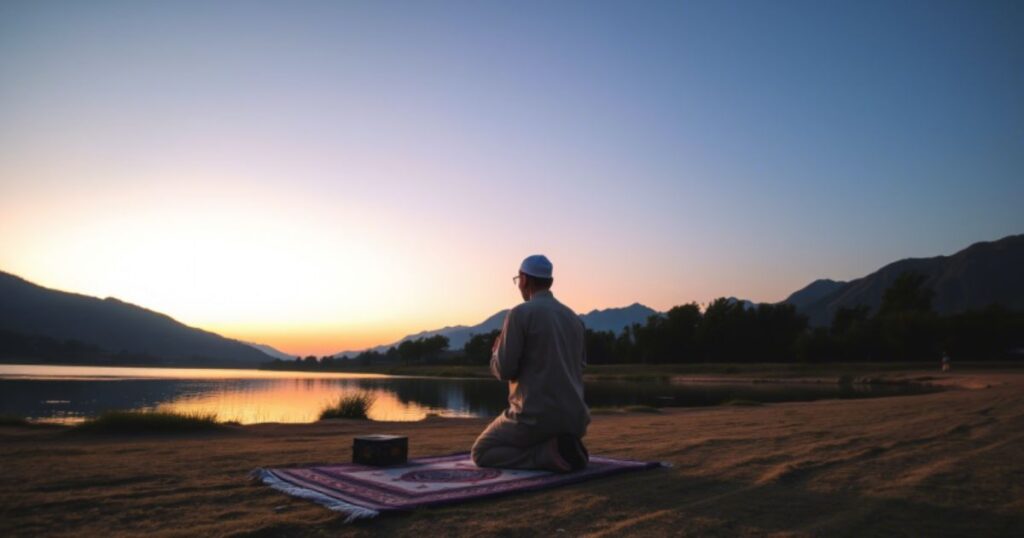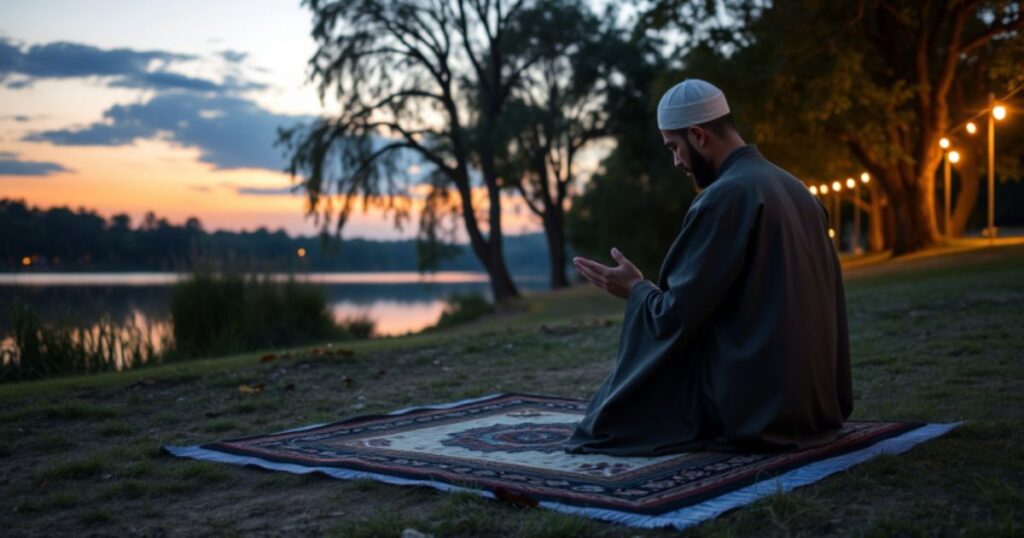Evening prayers offer Muslim believers a moment of calm reflection and spiritual restoration. At the end of a busy day, these prayers ground the heart and align the soul with divine guidance. In Islam, evening worship whether through Maghrib, Isha, or personal supplications is highly encouraged. It purifies the mind, helps release the burdens of the day, and draws one closer to Allah. Whether spoken in Arabic or whispered from the heart, each prayer holds the power to bring serenity. Evening is not just a time for rest, but a sacred hour for connection.
The Tranquility of Evening Prayers in Islam
Evening prayers prayers embody gratitude, forgiveness, and surrender. Through consistent evening devotion, believers nurture inner peace and spiritual discipline. It’s a time when worries dissolve into hope and anxiety turns into trust. The Islamic way of praying in the evening nurtures balance, calm, and nearness to Allah.
20 Powerful Ways Evening Prayers Can Bring You Inner Peace
1. Calms the Heart After a Busy Day
Evening prayers serve as a reset button for the soul after a long and hectic day. The Islamic tradition emphasizes quieting the heart before sleep through remembrance of Allah. Reciting Surah Al Mulk or making dua invites tranquility into the mind. These moments of worship reduce anxiety, stress, and overthinking. They help Muslims release worries that built up throughout the day. Turning to Allah in the evening shifts the focus from worldly distractions to divine presence. This spiritual shift encourages a deep sense of calm. When the heart remembers Allah, it finds contentment. Regularly engaging in these prayers prepares the soul for restful sleep. Thus, the heart feels lighter and the mind more at ease.
2. Strengthens Your Relationship with Allah
Evening prayers deepen your bond with the Creator. In Islam, turning to Allah consistently is a sign of strong faith. Evening is a sacred time to thank Him for blessings and seek His forgiveness. Speaking to Allah before bed shows sincerity and trust. These quiet moments invite divine mercy and nearness. A believer feels more connected to Allah through daily evening worship. It builds a spiritual friendship that continues to grow. With each prayer, love for Allah becomes more rooted in the heart. Consistency in evening devotion is a sign of spiritual maturity. Over time, your relationship with Allah becomes the anchor of your peace.
3. Purifies the Soul Before Sleep
Purification of the soul is a vital element in Islam. Evening Supplications cleanse the heart of arrogance, jealousy, and hidden sins. Before closing your eyes, you get a chance to self-reflect and repent. Praying Isha and making dua invites forgiveness from Allah. It’s a humble act of turning to Him in need and gratitude. This nightly habit wipes away the spiritual stains of the day. It restores clarity, honesty, and humility in the believer’s heart. The soul feels light and free of guilt. By asking Allah for pardon, you sleep with a clean heart. This purifying effect is essential for a peaceful mind and a refreshed soul.
4. Reduces Anxiety and Mental Clutter
In today’s fast paced life, anxiety can take hold easily. Evening prayers, however, are a powerful way to calm the mental storm. Islam teaches mindfulness through structured prayer and remembrance. The repetition of verses and words of praise soothes the nervous system. Each dhikr or supplication brings the believer into the present moment. This mindfulness removes mental clutter and brings clarity. By laying your concerns before Allah, your burdens feel shared. This form of surrender leads to emotional healing. The prayer mat becomes a space of therapy and peace. And as stress fades, the soul finds restful stillness.
5. Encourages Gratitude and Reflection
Gratitude is central to Islamic spirituality. Evening Supplications provide the ideal moment to reflect on the blessings of the day. Even in hardship, a believer finds reasons to thank Allah. Through consistent evening devotion, thankfulness becomes a habit. These prayers teach that each breath, each moment, is a gift. A grateful heart is naturally more peaceful and content. By focusing on what you have rather than what you lack, stress decreases. Evening reflection makes you aware of Allah’s mercy in everyday life. Over time, your heart becomes more joyful and your faith more resilient. This awareness is the foundation of inner peace.
6. Promotes a Peaceful Sleep Cycle
Islamic teachings value healthy sleep that begins and ends with remembrance. Evening Supplications promote both spiritual and physical rest. Supplications like Ayat ul Kursi are known to provide protection through the night. When you end your day with prayer, the mind calms naturally. This reduces insomnia, nightmares, or racing thoughts. The body begins to align with spiritual calm. Consistent practice even improves overall sleep quality. Peaceful rest allows for better energy and emotional resilience the next day. Allah’s remembrance acts as a shield against harmful influences in sleep. Through this nightly habit, believers find both peace and protection.
7. Builds Discipline in Worship
Spiritual discipline is a pillar of Islamic growth. Evening Supplications train the heart to commit despite distractions or fatigue. By praying regularly in the evening, you form a stable worship routine. It encourages responsibility and devotion. Even when you’re tired, you choose Allah over comfort. This habit builds consistency in Ibadah worship, a key goal in Islam. Over time, discipline in evening prayer spills over into other areas of life. The more structured your worship, the more grounded you become. This inner structure creates mental peace and stability. Discipline strengthens the spirit and nurtures divine focus.
8. Protects from Evil and Harm
Islam teaches that night time is a vulnerable period for spiritual forces. Evening Supplications act as a shield against evil influences. Reciting Surah Al Falaq and Surah An Naas are part of the Sunnah for this reason. These words create a barrier of divine protection. They prevent nightmares, fear, and the whisperings of Shaytan. Allah’s names, when uttered in the evening, become a spiritual fortress. Through these sacred words, a believer sleeps in safety and trust. Peace comes from knowing that Allah is the ultimate Guardian. The fear of the unknown disappears. In their place arises spiritual safety and calm.
9. Helps Organize Thoughts and Emotions
Evening prayers allow time to sort through the emotions of the day. By the end of the day, the mind is often overwhelmed. Supplication helps organize scattered feelings. The act of turning to Allah clears confusion. Thoughts are reordered through divine remembrance. Islam encourages emotional honesty with Allah. In these prayers, you can speak your heart fully. The emotional release brings relief and inner order. As chaos turns to clarity, peace becomes attainable. Regular evening prayer becomes emotional therapy rooted in faith.
10. Strengthens Hope and Resilience
Life often brings hardship, but Evening Supplications ignite hope. Islam teaches that Allah is close to those who call upon Him. In quiet evening supplication, you renew your trust in divine mercy. These prayers remind you that Allah’s help is near. Every hardship has an end, and every trial a purpose. Through consistent evening devotion, resilience grows. You learn to rely not on your own strength, but Allah’s. This reliance strengthens your emotional fortitude. Hope becomes the lens through which you see the world. Such hope brings deep and lasting peace.

11. Invites Angels’ Presence into the Home
In Islamic tradition, Evening Supplications invite the mercy and protection of angels into your space. Angels are drawn to houses where Allah is remembered, especially through Quran recitation and prayer. When you engage in Nightly Islamic Rituals with sincerity, it spiritually purifies the environment. This presence brings calmness and a feeling of divine safety. Prophet Muhammad ﷺ encouraged reciting specific surahs at night to attract angelic presence. The spiritual atmosphere created by prayer becomes one of serenity. Homes filled with remembrance are shielded from negative energies. The angels continue to bless such spaces throughout the night. This protection adds to the mental and emotional comfort of the believer. It is another way nightly Islamic rituals contribute to lasting inner peace.
12. Supports Family Unity When Done Together
Evening prayers have the power to bring families closer together. When members of a household pray Maghrib or Isha in congregation, they strengthen their bond through shared worship. This act instills values of cooperation, love, and spiritual leadership within the home. Children who witness their parents praying regularly develop stronger faith. Performing evening dhikr or reading Quran as a family becomes a beautiful routine. These shared acts of worship encourage unity and trust. A peaceful home begins with mutual remembrance of Allah. It sets a foundation of stability, respect, and love. Nightly Islamic Rituals become a source of spiritual nourishment for the entire household. This unity brings emotional peace and a strong sense of belonging.
13. Allows for Personal Spiritual Goals
Islam encourages setting spiritual intentions, and Evening Supplications help achieve them. Whether you aim to memorize Quran, increase gratitude, or strengthen tawakkul trust in Allah, night time devotion supports these efforts. Quiet evening moments are ideal for personal reflection. During this time, a believer can make heartfelt duas for growth and healing. Setting goals like praying Tahajjud or improving concentration during salah starts with commitment. Evening Supplications act as a reminder to remain focused on these goals. By aligning your ambitions with worship, they gain deeper purpose. Tracking spiritual progress daily can lead to incredible transformation. Allah loves those who turn to Him consistently. Through this, Nightly Islamic Rituals become a ladder to personal spiritual success.
14. Aligns Body, Mind, and Spirit
Evening Supplications engage every part of the self physical, mental, and spiritual. The movements of salah improve posture, blood circulation, and relaxation. The Quranic recitations calm the mind and foster concentration. The act of turning toward Allah spiritually connects the heart to its Creator. This holistic worship brings harmony to the whole being. Islam beautifully integrates bodily action with inward reflection. Evening prayers offer a reset after the day’s chaos. They bring all parts of yourself into one peaceful rhythm. Regular practice creates long-lasting balance in your life. The result is true tranquility and presence.
15. Connects You to the Ummah Spiritually
Though Evening Supplications are often performed in solitude, they still connect you to the wider Muslim Ummah. Millions of Muslims around the world bow down to Allah at similar times. This unity of worship creates a global spiritual bond. Even when praying alone, you are part of a greater movement of faith. The shared recitation of Surahs and adhkar builds a sense of belonging. This awareness can bring emotional support and motivation. It reminds you that your faith is part of something vast and beautiful. Islam encourages unity through communal practices, including synchronized prayer times. Evening prayers spiritually link you to your brothers and sisters in faith. That connection strengthens both the soul and the spirit.
16. Enhances Self Control and Patience
Evening prayers require you to step away from distractions, which builds self control. Whether it’s resisting the urge to scroll social media or delaying sleep for Tahajjud, these moments teach discipline. Islam places great emphasis on patience and endurance. Evening worship helps develop these virtues in a practical way. Supplicating for guidance and strength fosters inner resolve. These habits extend beyond prayer and into daily life. You begin to approach challenges with calmness and trust in Allah. Self restraint leads to fewer regrets and better decisions. This internal control contributes to emotional peace. Evening prayers, then, are a spiritual gym for patience and self discipline.
17. Teaches Consistent Mindfulness of Death and Afterlife
Islam encourages believers to remember death frequently as a way to live purposefully. Evening Supplications are a subtle yet powerful reminder of mortality. As the day ends, one naturally thinks of the eventual end of life. Praying at night reinforces accountability before Allah. It’s a moment to ask for forgiveness and renew intentions. Reflecting on the afterlife brings clarity to your actions. These thoughts encourage humility, repentance, and preparation for the Hereafter. Evening supplication serves as a gentle nudge toward spiritual awareness. This mindfulness helps align your daily actions with eternal goals. And with that awareness comes lasting inner peace.
18. Brings Barakah to the Night
Barakah blessing is something all Muslims seek, and Evening Supplications invite it into your night. Islam teaches that Allah’s mercy descends during the night hours. Engaging in worship during this time brings divine reward. It increases productivity, clarity, and restfulness. By ending your day in devotion, your night becomes spiritually rich. This sacred time transforms from idle hours into meaningful worship. The blessings gained impact both this world and the next. You feel a sense of divine favor in your sleep and waking hours. Even minimal acts like saying SubhanAllah or reading a few verses can bring immense blessings. Evening Supplications fill your night with light and goodness.
19. Cleanses Guilt from Daily Shortcomings
Nobody is perfect, and mistakes are part of human nature. Evening Supplications give believers a safe space to confess, reflect, and seek forgiveness. Islam highly values the act of taubah repentance. Nighttime worship is the ideal opportunity to ask for pardon. Guilt can weigh heavily on the heart, causing inner turmoil. But in prayer, you’re reminded that Allah is Most Merciful. Letting go of shame through sincere dua lightens the heart. This forgiveness leads to a clean slate for a new day. Guilt is replaced with hope, faith, and spiritual clarity. Through this, Evening Supplications cleanse both soul and conscience.
You may also like:PrayerTechy
20. Offers a Peaceful End to the Day in Full Submission
Ending your day in prayer brings full circle surrender to Allah. It is the final chapter in your daily journey of faith. Islam emphasizes the importance of beginning and ending each day with remembrance. Evening prayers ensure your last thoughts are filled with gratitude and trust. This final act of submission brings unparalleled calmness. You sleep knowing you’ve turned your heart to Allah completely. It brings emotional closure to the day’s trials and victories. This surrender renews your strength for tomorrow. With peace in your heart, your rest becomes more than sleep it becomes healing. That’s the sacred power of ending your day with Evening Supplications.
You may also like:PrayerTechy

Frequently Asked Questions
1. What time should evening prayers be offered in Islam?
They should be offered after sunset Maghrib and at night Isha, followed by voluntary nafl and supplications.
2. What should I recite before sleeping?
You can recite Ayat ul Kursi, Surah AlMulk, Surah Al Falaq, An Naas, and say general duas for protection and forgiveness.
3. Can evening prayers include personal dua?
Yes, personal duas are highly encouraged after Isha or while lying down before sleep.
4. Are there specific sunnah practices for night prayers?
Yes, like brushing teeth with miswak, performing wudu, and lying on the right side while making dhikr.
5. Is it allowed to pray Tahajjud immediately after Isha?
While possible, it is recommended to pray Tahajjud during the last third of the night for greater reward.
6. Can I pray with English translations if I don’t know Arabic?
Yes, especially for personal duas. Understanding is important for heartfelt connection.
You may also like:PrayerTechy
7. Are women encouraged to offer evening prayers too?
Absolutely. Women are equally encouraged to engage in evening worship and remembrance.
8. How does one make evening prayers a habit?
Start small with consistent dua after Isha and gradually add more recitation and reflection.
9. What if I miss Maghrib or Isha prayer?
They should be made up as soon as possible with sincere repentance.
10. Do evening prayers bring blessings during sleep?
Yes, they protect, bring calm, and invite Allah’s mercy and angels into your sleep.
You may also like:PrayerTechy

Conclusion
Evening prayers in Islam are a gift that wraps the day in serenity, reflection, and divine connection. They calm the mind, purify the heart, and anchor the soul in Allah’s mercy. Through these spiritual practices, believers find purpose, hope, and emotional renewal. Whether said silently or aloud, each prayer strengthens faith and restores inner balance. As night falls, the believer turns to their Lord with trust and gratitude. In return, Allah grants peace, blessings, and rest. Make evening worship a consistent habit and watch your inner peace grow steadily, night after night.

You may also like:PrayerTechy

Hi I’m Hamza Basharat SEO content writer with 4 years of experience and founder of PrayerTechy.com. I combine faith and strategy to help people discover how to pray with purpose, using well optimized, impactful content rooted in scripture and spiritual growth.


